Guests
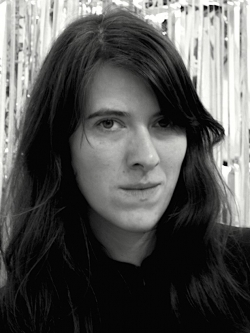

Eluned Zoë Aiano is a filmmaker, editor, and translator with a background in visual anthropology whose work is generally centred on Central/Eastern Europe. Her short All Her Dying Lovers, an animated documentary made in collaboration with Anna Benner, premiered at Hot Docs and was published on the New York Times Op Docs section. She attended IFDA Academy 2022. She has been selected for various residencies, including the Wapping Artist Residency in Berlin, the Pépinières Européennes de Création residency in Quebec and the ENOA residency with the Aix- en-Provence Opera Festival. She also writes about film and is a regular contributor to the East European Film Bulletin.


Otilia Babara is a documentary filmmaker from Moldova, currently based in Brussels. She holds a degree in documentary filmmaking from the DocNomads European Master program (Belgium, Hungary, Portugal), and is a 2013 Berlinale Talents fellow. She directed and produced the short films Irene (2015), selected for several international film festivals, and Women on Canvas (2009), awarded at the Astra and Cronograf Film Festivals. She is drawn to those who usually go unnoticed. Her films expose big wounds hidden in small details. She's fascinated by the untold stories of women.
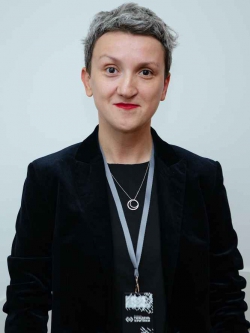

Daria Badior is a culture editor, critic, and journalist. Since 2017, she has co-curated the Kyiv Critics' Week film festival, which takes place annually at the end of October. In 2018, she co-founded the Union of Film Critics of Ukraine, which awards the best Ukrainian filmmakers with the Kinokolo prize. From 2011 until 2021, she edited one of Ukraine's most prominent online outlets, LB.ua. Since 2016, she has been a culture editor writing about film, and cultural and commemoration policies. Daria was a member of FIPRESCI and the Ukrainian Oscar committee. She works as a freelancer, contributing to Ukrainian and international outlets: LB.ua, Korydor, Osteuropa, The Independent, Der Tagesspiegel, and OKO press.
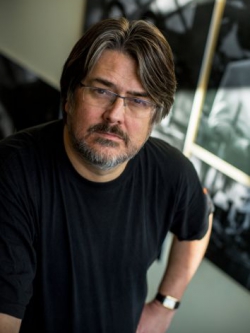

Csaba Bereczki is a film director, screenwriter and producer.Since 2011 he has been the International Director of the Hungarian National Film Fund. Hungary's representative in the Council of Europe's film co-production organisation Eurimages since 2010. Since 2014, he has been a permanent member of the organisation's Board of Directors.
In 2014, he shot the creative documentary SOUL EXODUS, a story of identity told through klezmer music, through the stories of five American-born musicians of Eastern European descent. The film was released in Hungarian cinemas in December 2016 and won the Best Documentary Award at the 2nd Hungarian Film Awards Gala in March 2017.
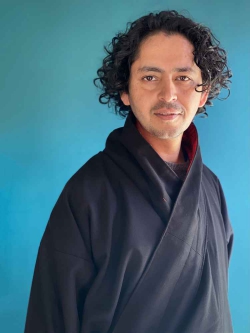

Arun Bhattarai’s first feature-length documentary The Next Guardian premiered at IDFA at the First Appearance Competition in 2017. Since then it has been screened at more than 40 international festivals (True/False, San Francisco IFF, MOMA DocFortnight, Camerimage, Docs Against Gravity, DOK.fest.München, Ambulante etc.), had theatrical releases and broadcasted around the world. His recent short documentary Mountain Man, premiered at IDFA 2022 in the short documentary competition. The film during its project stage won the Best Pitch Prize at If/Then Global Short Pitch and received funding from the International Documentary Association (IDA). Before becoming an independent filmmaker, he worked as a TV director at the Bhutan Broadcasting Service (BBS) for more than 5 years. His television documentary, Kelden won ‘The Asia Pitch’. He graduated from the 1st edition of DocNomads Joint Master in documentary directing in 2014 for which he was awarded full Erasmus Mundus scholarship in Lisbon, Budapest and Brussels. His second feature-length documentary Agent of Happiness is currently in post-production. The project was pitched and developed at Marché du Film Cannes Film Festival and TFI Network market. The project has also received funding from the Sundance Film Institute and the catapult film fund among others. Arun is a Berlinale Talent 2021.
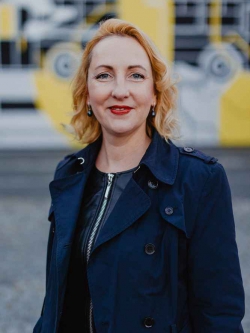

On June 1st, 2018, Zuzana Bieliková was appointed the manager of the Slovak Film Commission (SFC) – the organizational unit of the Slovak Audiovisual Fund. Under her leadership, a platform was created that actively presents the possibilities of filming in Slovakia, monitors the activities of film professionals intending to strengthen their position on the market, and continuously works with domestic and foreign producers who want to shoot in Slovakia. Since its launch, SFC has also been promoting the greening of the film industry and has created an enviro platform for film professionals where they can find useful information on how to film audiovisual works to reduce the environmental impact. SFC is involved with Flanders Audiovisual Fund and ProMalaga in creating an accessible and user-friendly carbon calculator: EURECA.
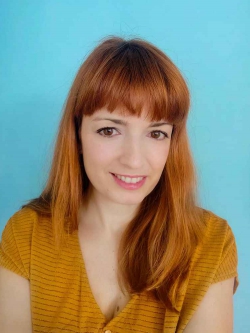

Chiara Boschiero is head of educational projects and senior programmer for the Biografilm Festival in Bologna, Italy. She graduated in Film Production at the National Film School of Rome, and received her Master's Degree in Human Rights and Democratization in Latin America (LAT.MA) in Buenos Aires. She has 18 years of experience in the development of international co-production film projects, and is a trainer in cinema and human rights in Italy and Argentina. Before Biografilm Festival, she was the production manager of the International Human Rights Film Festival of Buenos Aires, Argentina.
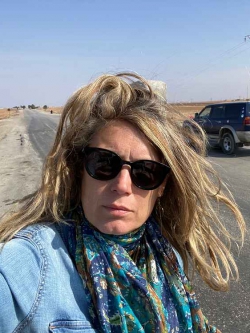

Pascale Bourgaux has covered all of the conflicts and crises in the Middle East in recent years. She has won numerous international awards for her reports, documentaries and books in Syria, Iraq, Iran, and Afghanistan.
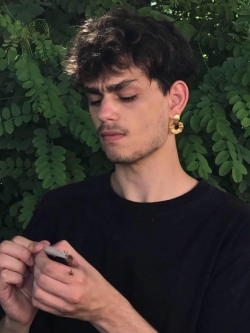

From an early age, Noah Cohen was driven by a desire to make films. At the age of 21, he entered the CinéFabrique to work in production. There, he practiced directing both fiction and documentaries. He hopes to continue in this direction.


Pamela Cohn is a freelance film & video curator, arts & culture writer, nonfiction story consultant and dramaturge for filmmakers and moving image artists. She has worked as a professional mentor for such entities as Open City London's Assembly and The British Council / Scottish Documentary Institute’s program, Connecting Stories. Pamela is the author of Lucid Dreaming: Conversations with 29 Filmmakers (OR Books New York & London, 2020) and produces, writes and hosts The Lucid Dreaming Podcast: Conversations on Cinema, Art & Moving Image in cooperation with Lono Studio, London. She has been a contributing writer for MIT’s Open Doc Lab blog site IMMERSE; Filmmaker Magazine; BOMB Magazine; The Calvert Journal; Senses of Cinema; Documentary Association Europe; and works as a freelance writer for film print and web publications, catalogues and artist materials. Pamela created the blog Still in Motion, dedicated to the documentary form, active from 2007 to 2015. She works as a host, moderator and interlocutor for filmmaker talks, panels and roundtables at an array of international festivals and film exhibition events.


Marion Czarny is a programmer, curator and project manager for educational activities and mentoring programs. She holds a postgraduate degree in arts management from la Sorbonne Nouvelle University, and completed some of her studies in the USA and Ireland. She worked as an editorial assistant for various cinema magazines, and as a programmer for several festivals before joining FIPA in 2008. Head of CAMPUS at FIPADOC, she supervises all editorial content for young audiences, students, and emerging directors. She oversees the various FIPA educational and training programs, such as the Young Europeans Jury or First Films Pitches, and curates the New Talent selection of the festival. She is currently involved in three European film festival networks, developing and designing innovative training programs based on documentary films. With her work, Marion is constantly involved in empowering youth through the prism of documentaries.
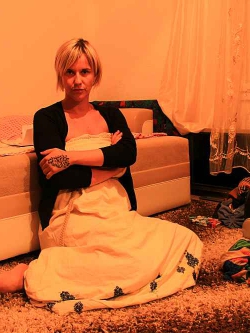

Tea Vidović was born 1986, in Zagreb. She graduated with a BA in sociology and an MA from the Zagreb Faculty of Humanities and Social Sciences. She co-organized the photographic-visual-music exhibition What Is Balkan? – Balkan Bude, to raise awareness about the presence of migrants in the local community. In 2011 she enrolled in the informal training program, Peace Studies in Zagreb, and collaborated on research for the film We Wanted Workers, Instead We Got People, by Đuro Gavran. In 2013 she began Restart’s Documentary Film School and developed ideas for her first documentary film. She has been employed at the Centre for Peace Studies since 2012, working on the integration of migrants into immigrant communities and other migrant-related issues.
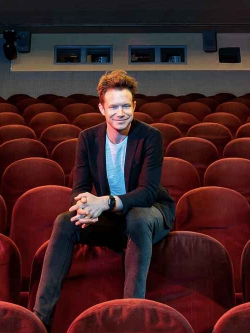

Dániel Deák was born in Budapest, where he currently lives. In 2007, he founded Daazo.com, an online short film-sharing website supported by the MEDIA program, which made numerous high-quality short films accessible. In 2013, he launched the Friss Hús festival, which has since become Hungary's largest short film forum. Between 2015 and 2020, he served as the professional leader of the Filmalap Incubator Program. Since 2019, he has been organizing the Budapest Debut Film Forum, a workshop for first-time filmmakers in Central Europe. He has been involved in creating various publications and magazines, including World of Shorts, Hungarian Film Magazine, and as the publisher and author of the Friss Hús Future Cinema magazine.
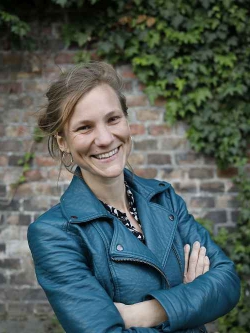

Asia Dér graduated as a documentary filmmaker in the DocNomads international MA programme. Her first feature-length film, Her Mothers (co-directed by Sari Haragonics), has been screened at international film festivals in over 30 countries and has won numerous awards, including Best Film at the DOKER Moscow International Film Festival and at the Crossing Europe Film Festival in Linz. The film was co-produced with HBO and supported by the Sundance Institute. With her previous films, she participated in workshops at ZagrebDox Pro, CIRCLE Women Doc Accelerator, East Doc Platform, Cannes Docs and Docu Rough Cut Boutique. Her documentary film about the life of Lajos Kassák, Howling Like We Do (2022), was awarded the Best Director prize at the FilmArte Art Film Festival in Berlin in 2023. She is currently writing her PhD thesis and teaches in the DocNomads international MA programme. She is a member of the board of the Hungarian Documentary Association (MADOKE) and the Association of Film Artists.


Goran Dević studied law, archaeology, and film art at the Academy of Dramatic Art, University of Zagreb, Croatia, where he currently teaches documentary film. His documentaries and fiction films have won awards in Pula, Cottbus, Prizren, Prague, Sarajevo, Oberhausen, Leipzig, Motovun, and Zagreb. His feature film debut, The Blacks, co-directed and written with Zvonimir Jurić, was critically acclaimed. Retrospectives of his documentaries have been featured at Arsenal Berlin, MAXXI Roma, Crossing Europe Film festival Linz, Beldocs, and Zagreb. He co-founded the production company, Petnaesta umjetnost.
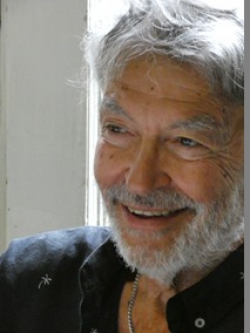

György Dobray (born 1942, in Budapest, Hungary) graduated from the Department of Cinematography of the Hungarian Film Academy in 1965. He has produced documentary, educational, and literary films for Hungarian Television, and fiction films for the Hungarian Film Production Company. He received the Hungarian Balázs Béla Award in 2010.
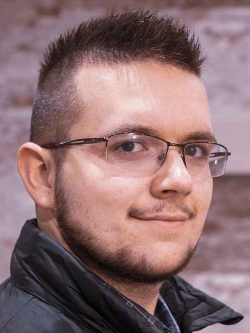

Ádám Dombovári is a student of communication and media studies at the Budapest Metropolitan University. He has been interested in film criticism since his high school years. His favorite documentaries include The Social Dilemma, 100 Years of Warner Bros, and Navalny.
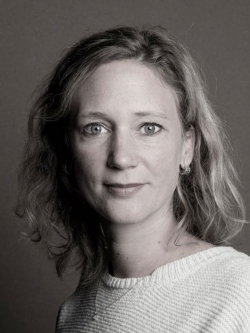

Els van Driel is a freelance documentary filmmaker. She created the award-winning youth documentary series, Just Kids, about children’s rights, and was co-founder/director, together with Eefje Blankevoort, of the multimedia productions The Asylummachine and The Deal, an analysis of the consequences of the 2017 EU-Turkey deal. In 2020, she co-directed Shadow Game, a multi-award winning transmedia documentary project.
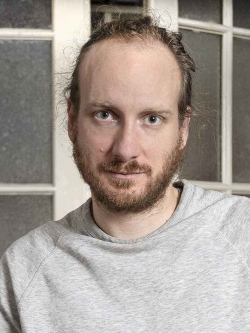

Máté Fuchs is a documentary filmmaker from Hungary. He graduated from the University of Theater and Film Arts (Budapest, Hungary) in 2019. He started his DLA studies in 2021, at Mozarteum University in Salzburg. He has worked on a variety of films, documentaries, and other projects. He is a founding member of the Hungarian Documentary Association (MADOKE), as well as the Freeszfe Association.
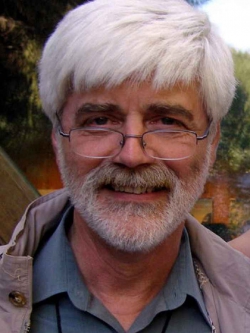

Gyula Gazdag is a screenwriter and director of film, theater, and television, and Distinguished Professor Emeritus at UCLA’s School of Theater, Film, and TV. He has served as Artistic Director of the Sundance Filmmakers Lab since 1997. He has worked with young screenwriters at the Script Station of the Berlinale Talents since 2006, and mentors young talent at Sarajevo Talents since 2015. He has conducted directing and screenwriting workshops in several countries. Gazdag has directed several films, his documentaries include: A Poet on the Lower East Side – A Docu-Diary on Allen Ginsberg, Hungarian Chronicles, Package Tour, The Banquet, The Resolution [Co-directed with Judit Ember], The Selection and The Long-Distance Runner. Most of Gazdag’s films were banned in Communist Hungary and were denied foreign exhibition.


Lea Glob (1982) graduated as a director from the National Film School of Denmark in 2011. She co-directed Olmo & The Seagull with Petra Costa in 2014. In 2016, together with Mette Carla Albrechtsen, she co-directed the feature documentary Venus, about sexuality from a female perspective. The film became a moment to share thoughts on sexuality and identity in an attempt to formulate a language and reclaim the female body. Glob followed the story of Apolonia Sokol for years, creating a double-sided portrait of the artist as a young woman. Apolonia, Apolonia is her first documentary feature as a solo director.


Kardelen Gökçedağ was born in Izmir, Turkey. She graduated from the Department of English Language and Literature at the University of Ege in 2014. Later, she received a Master’s Degree from the Department of Film Studies at Eötvös Loránd University. She worked for various media and communications institutions in Hungary and Turkey. She is currently studying communications and media at Budapest Metropolitan University. Apart from research, she is interested in making short films.


Jessica Gorter is a Dutch documentary filmmaker. She studied directing and editing at the Dutch Film and Television Academy in Amsterdam. She lived in the United States as a teenager, and after completing her studies, worked and traveled in Russia for a longer period of time. Her experiences in both of these worlds, coupled with her passion for photography, form an important basis for her further works. Her award-winning films have been screened worldwide at film festivals and universities, and have been theatrically released and broadcast internationally. She has also directed for Dutch television (Human, VPRO) and worked as an editor for various documentaries. Her documentary, 900 Days (2011), was awarded best Dutch film at IDFA 2011.
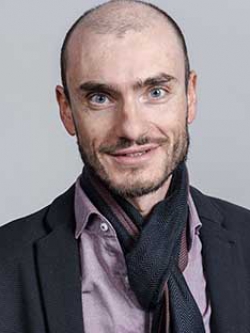

Zsolt Gyenge works as Associate Professor at the Moholy-Nagy University of Art and Design (Budapest, Hungary), where he teaches courses in film analysis, avant-garde cinema, film theory, film history, and visual communication theory. His field of research includes interpretation theories (phenomenology, hermeneutics), moving image installations (video art) and Romanian Cinema. He is the author of the book Image, Moving Image, Interpretation: A Theory of Phenomenological Film Analysis (published in Hungarian). He is active as a freelance film critic for more than 20 years, and currently is the editor of the scholarly journal on design culture, Disegno.
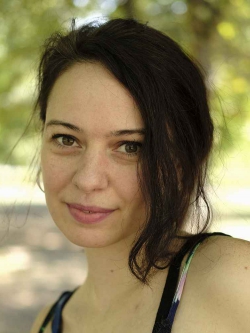

Anna Gyimesi was born in 1985, in Budapest. After receiving her degree in medicine in 2011, she turned to filmmaking. She graduated from the film directing program of the University of Theater and Film Arts, Budapest, in 2019, and from documentary film directing in the DocNomads Erasmus Mundus Joint Master Course in 2021. Her interests are taboo social dilemmas represented through personal dramas, especially connected to motherhood, womanhood, and social marginalization. Her latest short, Affricate focuses on a single mother raising her disabled teenage daughter while facing her own deeply-buried needs. The film premiered in the short film competition of the Sarajevo Film Festival and screened, among many others, at PÖFF Shorts 2022, Seattle International Film Festival, and OFF-Odense International Film Festival. Recently, she has been focusing on the development of her debut, Soft Hours, under the frame of Midpoint Feature Launch 2023. Falling is her graduation film for the DocNomads Joint Master Programme.
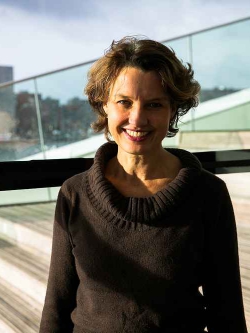

Bregtje van der Haak is documentary filmmaker, journalist, and since 2023 she is Director of Eye Filmmuseum in Amsterdam. She studied dance in Paris, political science and law at the University of Amsterdam and the New School for Social Research in New York and journalism at Columbia University. Van der Haak directed multiple documentaries on social change, including the VPRO Backlight series as well as Philip Johnson: Two of a Kind (1998), Lagos Wide & Close (2005), Saudi Solutions (2006), Satellite Queens (2007), Grand Paris: The President and the Architects (2009), California Dreaming (2010), Aftermath of a Crisis (2011) and DNA Dreams (2013).
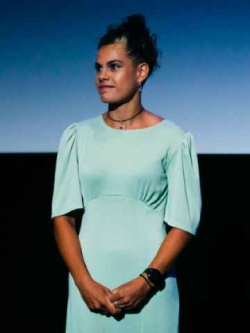

Catherine Haigh has a passion for anthropology and ethnographic research. During university, she specialized in women’s health and conducted research with Syrian refugees that led to an award-winning thesis on migration and fertility. Cat is currently a sales manager for L’Oréal. Outside of work and film producing, she’s an avid traveler – from solo tours of India, to volunteering for earthquake recovery projects in Nepal.
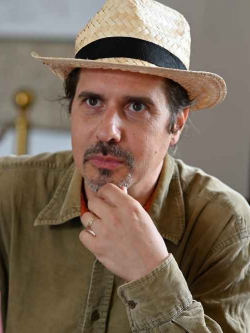

Gergely Hajnal has directed successful experimental, short, and documentary films. His main characters are often people in extreme life situations who strive towards positivity. For the past ten years, he has organized media trainings, film clubs, and film festivals. In the past almost two decades, he has worked for various media and studios, and has participated in the creation of many documentaries, fiction films, commercials, educational films, and television programs. He creates video clips and scientific-educational films, and directs concert and theater broadcasts. He writes film critiques and reviews, prepares educational material on film, and is a jury member for Hungarian and international film festivals.
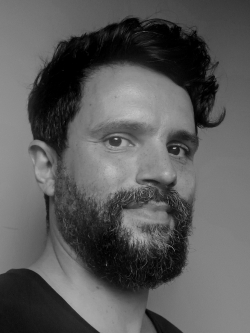

Pedro Harres is a director, animator, screenwriter, and multimedia artist born in Porto Alegre and based in Berlin. He holds a BA in Cinema from UNISINOS (Universidade do Vale do Rio dos Sinos) and a BA in Philosophy from UFRGS (Universidade Federal do Rio Grande do Sul), both in Brazil; and an MA in Animation Direction from Babelsberg Film Universität, Germany. Among his previous works are the short film “A Smaller Animal (Um Animal Menor)”, which received several awards in Brazil; The video installation “Ego Machine (EgoMáquina)”, and the short film “Castillo y el Armado”, Oscar-qualified in 2015 and premiered in the Orizzonti competition at Venice Film Festival. “From The Main Square” is his Master’s thesis in Directing Animation at Babelsberg Film University, his debut in interactive VR, and won the Immersive Grand Jury Prize at the 79th Venice International Film Festival 2022.
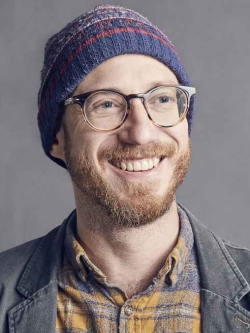

Gábor Hörcher studied Psychology, Law, Film, and is currently pursuing a PhD in Art&Design. He has lived in the US, France and Cambodia, where he taught courses on Human Rights at a local university. He started filmmaking and working with director-producer, Marcell Iványi in 2008. Since then they run a company, KraatsFilm together producing films and theatre performances. Gábor’s first feature film project, Drifter was selected for the European Film Award and won ten prizes including the Best First Appearance Award at IDFA, it went on to attend more than 40 international festivals and was screened in theaters. His latest fiction short, Ricsi was in competition at over 20 festivals and won the Best Short Fiction Prize at the Mediawave in Hungary. He is now finishing post-production on his second feature film, Emma and Eddie (working title). The film was co-produced with HBO and Oscar-winning French producer Christine Le Goff.
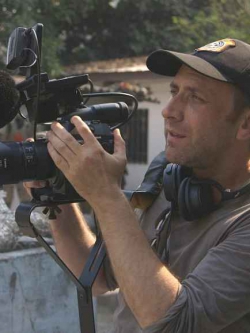

After studying Political Science, Armel Hostiou studied cinema at La Fémis film school in Paris in the camera department. His graduation film SoLoS, that he directed, has travelled and won several awards nationally and internationally. He has since dedicated himself to directing, first of short films but also installations and music videos. His first feature film Rives premiered in ACID Cannes and was distributed in France in 2012. His second feature, shot in New York, Une Histoire Américaine, premiered at Lincoln Center in New York at RDV with French Cinema and was distributed in France in 2015. His first documentary La Pyramide Invisible premiered at Cinema du Réel in 2019. His last feature The Other Profile premiered at the main competition of CPH:DOX and will be released in theatres in France by Météore Films in June 2023. He is also working on a script for his next fiction feature film.
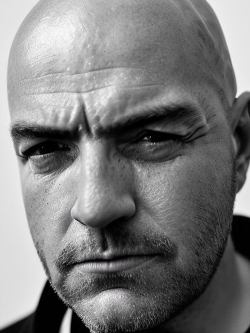

Jesper Jack is an award-winning producer and the co- founder of House of Real, a prominent collective of non-fiction filmmakers in Scandinavia. He also served as the international editor at Op-Docs at The New York Times from 2021 to 2023. Jesper is an alumnus of prestigious programs such as EAVE, Screen Leaders, and Doc Campus. He is a regular guest professor at NYU Tisch, and a lecturer at the National Film School of Denmark. Between 2009 and 2011, he held the position of documentary film consultant at the Danish Film Institute. During his tenure, he commissioned over 30 films, including the Academy Award-nominated The Act of Killing and the Tribeca Film Festival Best Documentary winner, Democrats. Moreover, Jesper is currently pursuing training as a psychotherapist, driven by a vision to enhance mental health in the documentary field.
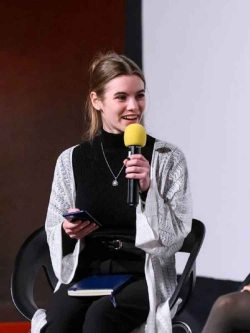

Kamilla Klára Joób fell in love with documentaries at ELTE's Department of Communication and Media Studies where she is currently a student. For three years, as a UNICEF Young Ambassador for Hungary, she has worked to empower children and young people to learn about their rights, climate change, and how they can be active agents of positive change.
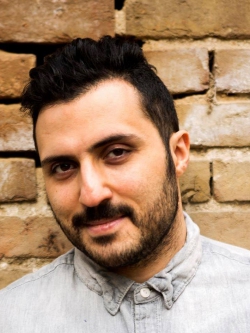

Mohammad Reza Jurabchian works as an independent filmmaker and cinematographer based in Tehran. He received his BA in photography from Azad University. He was among the best photographers of the year in the 10th Iranian National Biennial of Photography and had several group exhibitions in and outside Iran. He made several short films and documentaries which have been selected for a number of international film festivals. Jurabchian's films are heavily indebted to photography. He tries to depict his relationship with the world around him and his lived experience. He and his sister, Farnaz Jurabchian, started an independent film company, F&M Productions, where they work as co-directors and producers. They directed Overruled and Silent House together.
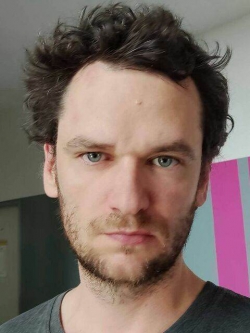

Michal Kabat, PhD, is a teacher at the video game faculty of UCM University in Nagyszombat (SK). He researches the memory of video games in post-socialist countries and virtual worlds.
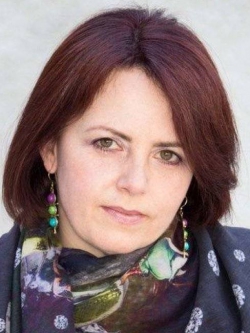

Hanka Kastelicová is the VP and Executive Producer of Documentaries for HBO Europe. Based in the Prague office, she works closely with HBO Europe’s production centers and is responsible for the development and production of HBO Europe’s documentary films. She commissions and co-produces documentary programming for HBO Europe, focusing on feature length productions, and documentary series which should have a strong connection with the countries where HBO Europe broadcasts.
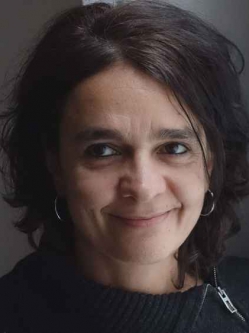

Anna Kis started her filmmaking career in 2002. After a decade of teaching, translation, and journalism, and a PhD course in Renaissance and Baroque English Literature at ELTE, she graduated at the University of Theatre and Film Arts in Budapest, as a director and film editor. She was the student of Péter Gothár and Ildikó Enyedi. Ever since she has been active as an editor and story editor of shorts (eg.: First Love by Ildikó Enyedi), documentaries and concert shows for TV. She has directed shorts and observational documentaries which have won several Best Documentary awards in Hungarian festivals (Home Paradise, Not About Family). Recently she has been active as the story editor of Fairy Garden by Gergő Somogyvári, shooting her own feature-length documentary Practices in Harmony (working title), co-directing and editing 80 Angry Journalists by András Földes. She is a member of MADOKE - the Hungarian Documentary Association.
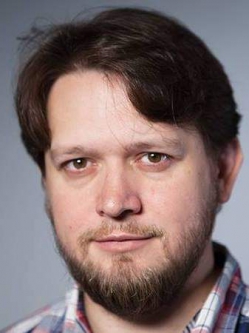

Volodymyr Kolbasa is a filmmaker and media artist with a background in classical cinema and immersive XR and media art. He also graduated as a cinematographer from the master's course in digital narratives at the international film school in Cologne and from the Viewfinder Erasmus Mundus master's course, within the latter program he also studied at the National Film School @ IADT, Ireland, SZFE, Hungary and the Baltic Film School, Tallinn. In addition to his film work, he also contributes to the development of AR projects for museum spaces and VR interactive films.
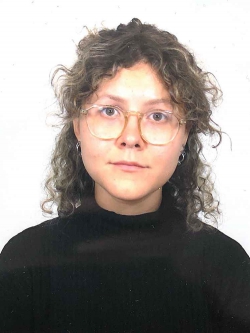

Magda Kopańska holds a degree in art history and culture management from the Academy of Fine Arts in Warsaw, and studied anthropology at the University of Warsaw. Currently based in Vienna, Austria, she contributes to magazines and various media platforms (SZUM 2022, ENRS 2022). She is currently focused on expanding her knowledge of ethnographical practices involving visuality and participatory methods. Magda is an MA student in Sociology and Social Anthropology at the Central European University.
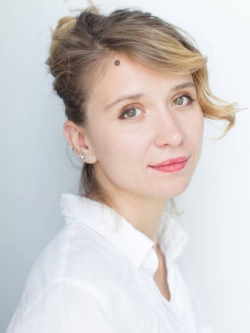

Born in Zaporizhzhia, Ukraine, in 1987, Alisa Kovalenko studied documentary filmmaking at the Karpenko-Kary University in Kyiv, and at the Wajda School in Warsaw, Poland. Her first feature-length documentary Alisa in Warland premiered at IDFA in 2015. Home Games screened at over 100 festivals and won numerous awards. She is the programmer for the international documentary competition of the Molodist film festival in Kyiv. After the launch of the Russian invasion of Ukraine on 24 February 2022, Alisa left the editing room of We Will Not Fade Away, and joined a volunteer unit of the Ukrainian Armed Forces (AFU), where she fought on the frontline in the Kyiv and Kharkiv regions. She fought in the trenches for four months before returning to finish We Will Not Fade Away, which premiered at Berlinale Generation 2023. Meanwhile, as the war in Ukraine continued, Alisa presented a project supported by Chicken & Egg Pictures and Netflix, based on footage filmed during her time in combat, at the IDFA Forum 2022.
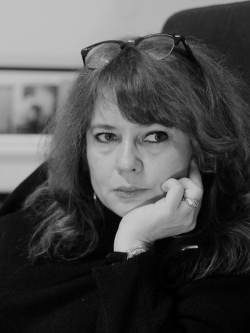

Réka is a Budapest-based editor with over two-decade-long experience in film and television. Some of her most important projects include work with famous directors, among them with Oscar winner István Szabó or Jerzy Skolimowski. She has received numerous recognitions for her work such as, among others, the Best Editors Awards of Hungary, Best Critics Award or PO-land Academy Award. She obtained her Master's degree at University of Theatre and Film Arts Hungary, and she also has a degree in Theater Science at the Pannon University Hungary. She has been doing education and mentoring work since 2015 at the University of Theater and Film Arts Budapest, Free SZFE Budapest, Sapientia Film University Cluj and Budapest Metropolitan Film University. She was a juror of international juries and a member of the selector committee for international documentary workshops.
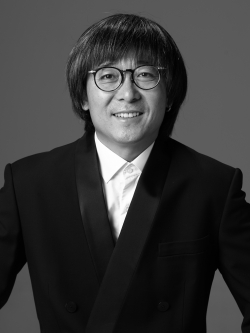

Zhao Liang is an independent documentary filmmaker, as well as a multimedia artist in photography and video art. His 2021 film I’m So Sorry focuses on the historical events and the current situation of humanity’s nuclear disaster in the context of global climate crisis. In 2015, Behemoth made history by being selected for the main competition section of the Venice Film Festival. The 2009 documentary film Petition was featured in the New York Times, was selected for the 62nd Cannes Film Festival and the 61st Locarno Film Festival, as well as won the Humanitarian Award (Documentary) at the 34th Hong Kong International Film Festival and the Best Film Award at the 7th Doclisboa Film Festival.
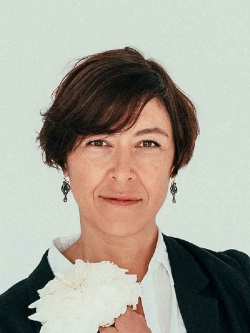

Natalia Libet is a film producer and a co-owner of the female-led production company, "2Brave Productions," based in Kyiv, Ukraine. She has produced and co-produced several successful feature debuts, including Kateryna Gornostai's Stop-Zemlia (2021 Crystal Bear Berlinale Generation 14+), Mantas Kvedaravičius's Parthenon (2019 Venice FF's International Critics' Week), Marta Smerechynska's Diary of a Bride of Christ (2022 Sarajevo FF), and Anna Buryachkova's Forever-Forever (2023 Venice FF's Orizzonti Extra Competition). She is a member of the European and Ukrainian Film Academies, and an alumna of EURODOC 2021. Currently, Natalia also serves as the program manager of Tatino Films' First Cut+, a semiannual workshop focused on marketing and positioning of feature films.


Born in Damascus, Lina is a documentary filmmaker, journalist and camerawoman. She has documented events in Jordan, Lebanon, Syria, and Turkey over the past ten years. She holds a master’s degree in documentary filmmaking from Essex University. Lina made short and medium-length documentaries, and her debut feature, 5 Seasons of Revolution, premiered at the Sundance World Cinema Documentary Competition in 2023.
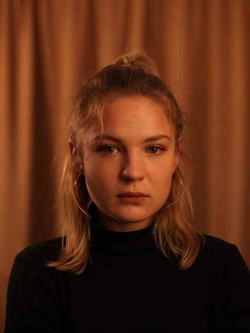

Lia Lőrinczy completed her first degree in contemporary, fine art curation. Working as a freelance editor on television shows, she developed an interest in motion pictures. In 2020, she joined the Documentary Director MA program at the University of Theatre and Film Arts. Over the last two years, she has made more than five short documentaries, both jointly and independently.
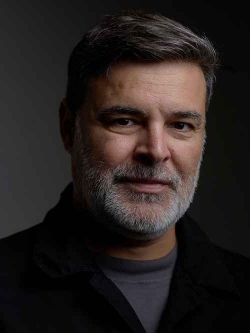

Damir Markovina was born in 1973, in Belgrade, Yugoslavia. In 2022, he graduated in Film and TV Directing (Documentary Film) from the Academy of Dramatic Art in Zagreb, having previously graduated in acting from the same school. He appeared in many Croatian films and TV series. He is a film director, producer, and writer. His short documentary film, Šihta was selected for the 25th Sarajevo Film Festival official student competition in 2019. His medium-length documentary film, Wait for Me won, among other things, the AJB DOC festival’s main award in Sarajevo in 2021, and Oktavijan – the Croatian national FIPRESCI award for the best Croatian documentary film. His second medium-length documentary film, Deserters won the best Central and Eastern European medium-length documentary and the Best Sound Design at Jihlava IDFF 2022, where it had its world premiere.


Oksana Moiseniuk was born in Ukraine, where she graduated as a journalist. She currently lives in the Czech Republic. In 2021, she shot a short documentary, Charón. Her debut feature-length documentary, 8th Day of the War premiered at Jihlava IDFF, in the Czech Joy competition, where it was the opening screening. The film had its international premiere at 38. DOK.fest München.
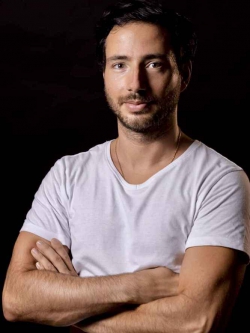

Gergely Mózes is a filmmaker based in Budapest. He is an assistant lecturer at the Eszterházy Károly Catholic University, a doctoral student at the University of Theater and Film Arts, and a stipend-receiving member of the Hungarian Academy of Arts. He did his BA in film and media studies at Kaposvár University, and his MA in filmmaking at the Budapest Metropolitan University. He also has a degree in Film Theory from the Eötvös Loránd University of Sciences. The animated historical documentary Until Death is his debut as a filmmaker.
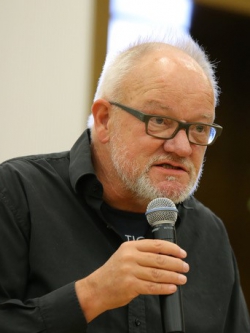

Tue Steen Müller has worked with documentary films for more than 20 years at the Danish Film Board, as press officer, festival representative and film consultant/commissioner. He is the co-founder of Balticum Film and TV Festival, Filmkontakt Nord, Documentary of the EU, and EDN (European Documentary Network). From 1996 until 2005 he was the first director of EDN (European Documentary Network). Since 2006, he has been a freelance consultant and teacher in workshops like Ex Oriente, DocsBarcelona, Archidoc, Documentary Campus, Storydoc, Baltic Sea Forum, Black Sea DocStories, Caucadoc, CinéDOC Tbilisi, Docudays UA, Dealing With the Past Sarajevo FF, as well as programme consultant for the festivals Magnificent7 in Belgrade, DocsBarcelona, Message2Man in St. Petersburg, and DOKLeipzig. He teaches at the Zelig Documentary School in Bolzano, Italy, and writes reviews at www.filmkommentaren.dk. He received several awards for his contribution to the European documentary culture.
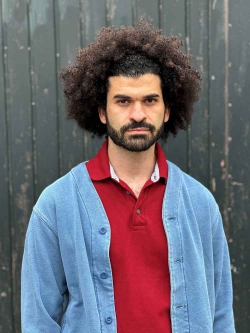

Ibrahim Nash’at (born 1990, in Jeddah) is an Egyptian documentary filmmaker based in Berlin, Germany. His career in journalism spans various formats as he has worked with several international channels and online platforms, such as Deutsche Welle, Al Jazeera, Business Insider, AJ+, Voice of America, and others. Ibrahim holds a master’s degree in documentary filmmaking from Met Film School. He co-edited Academy Award-nominated director Talal Derki’s latest film, Under the Sky of Damascus, which premiered at the Panorama section of Berlinale 2023, and won the Golden Alexander at the 25th Thessaloniki Doc Festival. Ibrahim has directed A Moment With the Wind, Home Away from Home and Berlin's Diversity, short films selected for multiple festivals around the world. Hollywoodgate is Ibrahim’s first feature-length film.
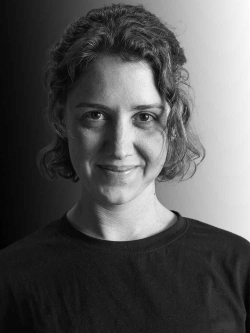

Growing up in the Philippines, Indonesia, Brazil, and Switzerland, in 2014 Nathalie Berger completed a Bachelor’s Degree in Political Science and Economics at Duke University (USA), and went on to earn a Master's Degree in Documentary Filmmaking from the Zurich University of Arts. In March 2019, she completed her first feature documentary film, Call Me Intern, about millennials striking back against unpaid internships. It won Best New Zealand Feature and Best Editing at DocEdge Film Festival 2019, as well as the Nigel Moore Youth Award at DOXA. As a director she often works alone, but also works on other people's documentaries as a cinematographer. Since 2022, she has worked as a teaching assistant in the Cinema Department at the University of Arts (HEAD) in Geneva.
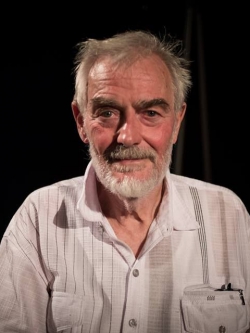

Peter Nestler (b.1937) is one of the most singular and important filmmakers to emerge in postwar Germany. In the early 1960s Nestler made a series of poetic films about the changing realities in rural and industrial areas and about the working class communities, mostly in Germany, but also in the UK, where he filmed A Working Men's Club in Sheffield (1965). In the same year he directed From Greece (1965), on the rise of and struggle against fascism followed by the unsparing and exigent In the Ruhr Area (1967). Opposition to his political views and film aesthetics led Nestler to Sweden, where he worked mostly for television. Since the 1970s, Nestler has directed an extraordinary body of work further expanding the form and themes of his first films, including history, the working class, anti-fascism, the history of labour and production, and immigration. In the past 20 years, Nestler's films have continued to focus on change, remembrance and preservation, as exemplified by The North Calotte (1991), a remarkable travelogue tracing the harmful effects of industrialisation on the Sami communities and the landscape of Northern Europe.
(Source: https://dafilms.com/)


Floris Paalman, Ph.D, is a senior lecturer in film studies at the Department of Media Studies, University of Amsterdam, and coordinator of the MA program "Preservation & Presentation of the Moving Image." He teaches courses on audiovisual archiving, curating, cinema histories, and research methods. He is currently involved with research on the ontology of film archives in regard to social history. He has been trained in cultural anthropology, urbanism, filmmaking, and media studies
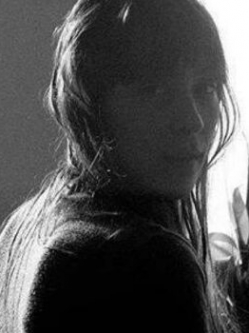

Zsófi Paczolay is the director of the short film Budapest Silo, co-director of the documentary Estou Aqui (Itt vagyok/I Am Here), co-founder of MOHA films collective in Budapest with Bíró Bálint, member of MOHA art collective in Amsterdam, and freelance artist and filmmaker. Her background is in architecture, social work, performance art, movement and basketball.
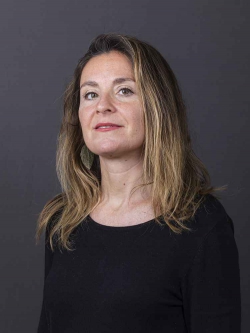

Anna Petrus is a filmmaker, film critic, cultural researcher, professor, and currently, Artistic Director of DocsBarcelona International Film Festival. She holds a degree in audiovisual communication from Pompeu Fabra University (Barcelona). She has directed multiple films, including video art, fiction, and documentary, which have toured festivals such as the Cannes Film Festival, Festival des Films du Monde (Montréal), Sitges - Festival Internacional de Cinema de Catalunya, and FicXixón, among many others. She has worked as a film critic for several relevant film magazines and newspapers in Spain (such as Dirigido por, Cahiers du Cinéma -Spain, and La Vanguardia). She is currently a contributor to the newspaper Ara, where she writes about cinema, audiovisuals, and feminism. She is a member of the Board of Directors of Dones Visuals (Visual Women), the association of women filmmakers in Catalonia.
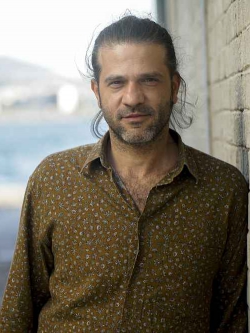

The films of Angelos Rallis push the boundaries between raw reality and fiction. He draws inspiration from his own life experiences and revolve around unconventional family constructs, post-traumatic behaviour, loss and fate. His visual and artistic approach resides somewhere between contemplative cinema, theatre and creative documentary with fictional aesthetics. The long takes and extended durations permit the director to depict the characters, framed by their immediate environment, in detail. His work induces a sense of slowness so that the viewer has time to understand and connect with the characters and to become immersed in the events unfolding before them.
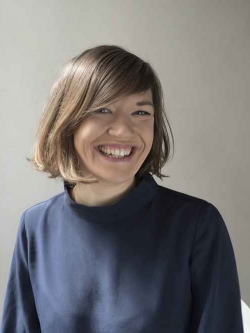

Johanna Råman is an experienced arts and culture, communications and creative production management professional with over 10 years of international experience both in Finland and in France. Johanna Råman is currently working as the Executive Director of DocPoint – Helsinki Documentary Film Festival, where she is in charge of the executive management, planning and development of the activities, fundraising, finance and HR. Founded in 2001, DocPoint is one of the largest documentary festivals in the Nordic countries. In Finland, it is the only festival solely dedicated to documentary films. Once a year it brings more than a hundred of the best and most talked-about creative documentary films from all over the world and Finland to the screens of Helsinki. Prior to DocPoint – Helsinki Documentary Film Festival, Råman has broad leadership experiences in a variety of artistic production, communication and consulting roles in the cultural scene and also in the animation and game industry.
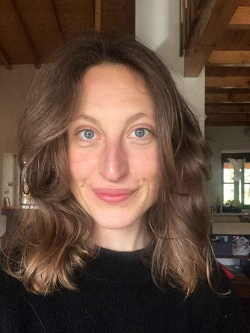

Anne Rethfeld joined DAE in May 2021. She is a project manager, cultural producer, writer and podcast producer who has worked for European film festivals and documentary organizations since 2014, including DOK Leipzig, CPH:DOX, DOX BOX e.V., European Film Market and Berlinale.She holds a Bachelor's in European Media Science and a Master's in Design Studies at Burg Giebichenstein, University of Art and Design Halle.


Szymon Rogiński (b. 1975 in Gdańsk). Visual artist, photographer, and author of photobooks. Lives and works in Warsaw. With photography as a base for his work and practice, for more than twenty years he has been working in series, focusing on nocturnes and the material qualities of light. His work, present in a number of collections (i.e. MuFo in Krakow, the Wroclaw Contemporary Museum, and the National Institute of Architecture and Urban Planning in Warsaw), has been exhibited in museums and galleries around the world. Outside of working solo, he enjoys collaborations, both in artistic and commercial contexts in the role of photographer/director. Inspirations for his works range from David Lynch and road movies, pop culture and Poland (as cliché, phantasm, and place), to the Anthropocene, postapocalyptic scenarios and visions, and the man-altered landscape. Right now, he is in the process of exploring the creative uses of drone photography, photogrammetry, as well as VR.
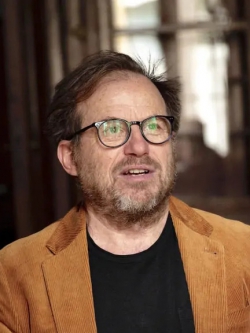
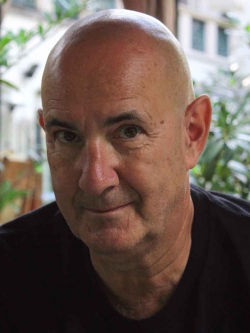

Since 1990, Michael has produced over 45 documentaries, TV doc series and feature films, among them internationally successful and highly-awarded films, such as Luna Papa (Bakhtiar Khoudojnazarov), Bella Martha (Sandra Nettelbeck), The Venice Syndrome (Andreas Pichler), Everyday Rebellion (The Riahi Brothers) and A Good American (Friedrich Moser, Executive Producer Oliver Stone). He wrote the scripts for several documentaries (i.e. Food Design, Hot Spot, BEER!, ÒRAIN – Beethoven), and directed TV documentaries. From 2009–2020 Michael worked as a tutor and adviser for the European MEDIA training program for script development SOURCES 2. Since 2018 he has concentrated almost exclusively on his work as a director and writer for his own documentaries. His awards include the Theodor Koerner Award for Literature (1987) and the Austrian Film Award for Best Documentary (2013).
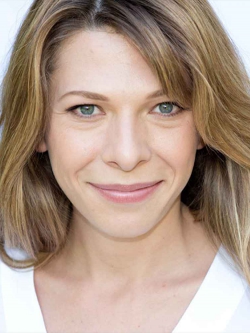

Tünde Skovrán was born in Transylvania, Romania. After graduating in 2005 from Babes Bolyai University (Cluj-Napoca, Romania) with a bachelor’s degree in drama, Tünde became a repertoire actress at the prestigious Hungarian State Theatre in Cluj-Napoca. In 2014, Tünde was invited to participate in the Sarajevo International Film Festival Talent Campus. She is a Berlinale Talent alumni. She made her movie debut in Puzzle (2013), for which she received the Best Actress in a Lead Role Award at two US film festivals. Presently, she lives in Los Angeles, where she was an observer at The Actors Studio West. In 2016 she created J.U.S.T. Toys, a pioneer, experimental theatre production company in Los Angeles. She produced and starred in acclaimed productions, the last of which opened off-Broadway in 2019, under the direction of Yuri Kordonsky. The documentary Who I Am Not is her first feature-length film as a director. As a work in progress, the film was awarded by Dok Incubator at IDFA.
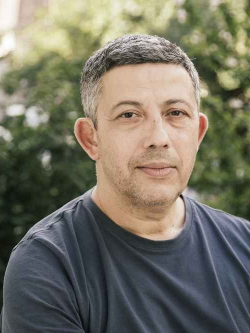

In the early 1990s, Solomon emerged as a young director of photography and he started making documentaries aside from filming feature films. Solomon was among the first Romanian film makers who committed themselves to a then compromised genre; today, he is one of the leading political film makers from Romania and active on the international documentary scene. His recent work triggered public debates about the function of documentary film within the public sphere and contributed to re establishing documentary film as an arena for reframing Romania’s recent history. Solomon’s previous work, The Great Communist Bank Robbery (2004), broadcast on Arte and as part of BBC4’s prestigious Storyville series, was awarded Best Film at the History Film Festival in Pessac, France and the Prize for Social Values at Documenta Madrid. His Cold Waves (2007) is a chilling slice of political history that played for 12 weeks in Romanian theatres. It deals with the love and hate story between Radio Free Europe, the Romanian audiences and the communist regime. Kapitalism our secret recipe (2010), speaks of the rise of a new ruling class in the East (produced for Arte and RTBF with Media support). Tarzan’s Testicles (2017), which premiered in Karlovy Vary, is a film about utopias & a metaphoric drama that threads the similar destinies of monkeys & men.
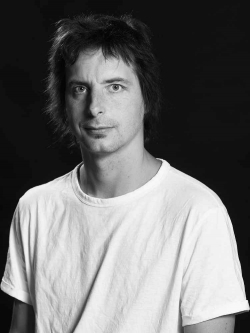

Gergő Somogyvári is a Budapest-based cinematographer and documentary director. After studying photography and journalism, he graduated from the University of Theatre and Film Arts (SZFE) as a cinematographer in 2008. For the past 14 years, he has worked both on fiction and non-fiction projects as a DOP, and has directed 5 short- and mid-length documentaries, which were screened internationally on television and at festivals. In 2008, his experimental documentary, Carta Azulejo – Tile Mail, received the most prestigious national award, the Main Prize of the Hungarian Film Week. Fairy Garden is his first feature-length documentary.


Born in 1964, Jannik Splidsboel studied film and art in Copenhagen and Rome, before graduating from EAVE. He has worked as a producer since the early 1990s, for RAI and ZDF, among others, on art, culture, youth, and more. Since 2004, he has been active as a documentary film director, with a dozen long and short films to his credit. His films have been praised internationally, including at the Berlinale and IDFA. He both wrote and directed Misfits, about LGBTQ young people in the American Bible Belt. The film was nominated for the Danish film critic award, Bodil. He has been a dramaturgical and artistic consultant since 2008, and teaches creative writing, pitch, development, and production.
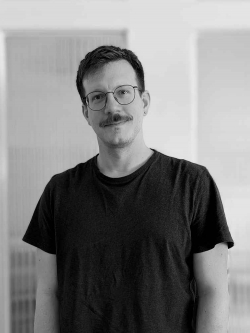

András Szabó, IT engineer, is the managing director of Code and Soda Kft. in Budapest, co-founder of Random Error Studio. He is the co-curator of Vektor VR, organized in cooperation with Verzió International Human Rights Film Festival. Since 2016, he has contributed to the implementation of several immersive projects as a producer, creator and technology expert.
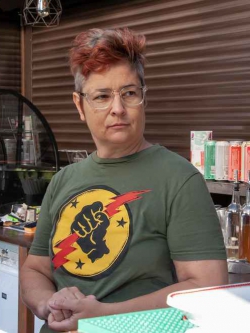

Mária Takács is a documentary filmmaker, video journalist and LGBTQ activist. Hidden Years, her first documentary about lesbian stories of the years before the regime change in Hungary, won the Audience Award of the 11th Verzió and the ERSTE Social Award. Her documentaries Hot Men, Cold Dictatorships (2015), More Than a Relationship (2016), and Game On – Queer Disruptions in Sports (2020) have been screened at numerous film festivals in Hungary and abroad. Her film about Márta Bolba evangelical pastor, The Pastor of Mandák House (2019), was fined by the current government for addressing contemporary political issues, but has been screened in cinemas and religious and civil communities. Currently, she is working on a participatory human rights soap opera, The Second Golden Age..., and as a video journalist, she continues to document the events of Józsefváros (the district 8th in Budapest). She received the Hégető Honorka Award in 2020 for her journalistic work and the Emma Goldman Snowball Award in 2023 for her work as a lesbian feminist documentary filmmaker.
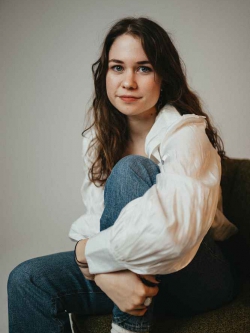

Lilian Tánczos is a 23-year-old emerging filmmaker from Budapest, and a student at the Lumiere Film School. She enjoys observational, situational documentaries that show people's everyday lives and challenges. She is particularly interested in documentaries that use animation to make their stories visually richer and more expressive. One of her favorite films is Waltz with Bashir, an animated documentary about the 1982 war in Lebanon.

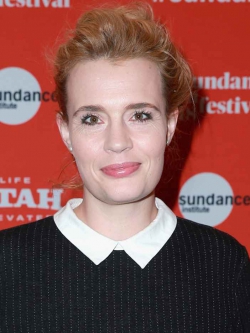

Bernadett Tuza-Ritter is a documentary film director, editor, mental health specialist, coach. In the film industry since 2006, he has worked as an editor, scriptwriter, and director in numerous feature film and documentary productions. In 2017, his first full-length documentary entitled "A Woman Captured" was presented, which achieved huge international success. During his studies at SOTE and Károli Gáspár University, he began to deal with the mental health of filmmakers and creative professionals, as a result of which he and his colleagues created the film and mental health center called The Well-being Center, which is specifically for the mental health of those working in the film and theater arts profession. focuses on its protection and service.
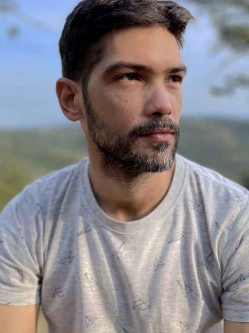

Nemanja Vojinović studied film directing at the Faculty of Dramatic Arts in Belgrade, where he graduated in 2012 as co-author of the film Where’s Nadja, with colleagues from his class. His short documentary film Reality, Fuck Off won awards at regional and international festivals. He follows his feature documentary debut Las Distancias (2017), with Bottlemen. He is a member of DokSerbia – Union of Serbian documentary filmmakers.
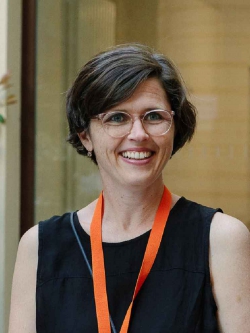

Johanna von Websky studied Spanish and English/American Studies at Humboldt Universität zu Berlin, and at Universidad de Sevilla. From 2008 to 2011 she was project coordinator in the field of visual arts, film and new media at House of World Cultures in Berlin, with a focus on film. She coordinated film festivals, such as Première Brazil and Wassermusik, and film series accompanying different exhibitions. After moving to Munich in 2011, she worked at Prix Jeunesse International, the oldest children's and youth television festival worldwide. In 2015, Johanna joined the DOK.fest München team. From 2015 to 2018, she was head of film administration and joined the management board as an assistant in 2019. She took on tasks in the areas of partner communication and project coordination. Johanna has been a permanent member of the program committee since the beginning, and is responsible for the festival venues.
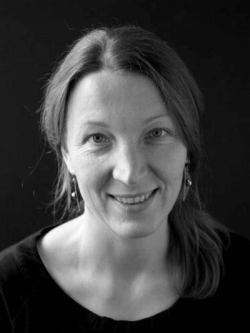

Helena consults for documentary film programmes in Eastern Europe and serves as programme advisor for MIDPOINT Institute. She is former longtime programme director of the One World IFF Prague, and former co-head of studies of CaucaDoc, a training initiative which supported creative documentaries in the South Caucasus. Helena has collaborated with various film festivals and served as jury member in Amsterdam, Copenhagen, München, Prizren, Tbilisi.
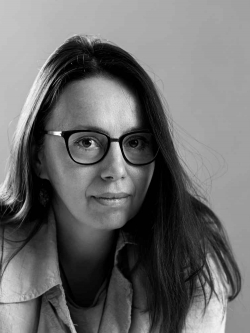

Efthymia Zymvragaki got her Master's Degree in Artistic Productions and Research at the Faculty of Fine Arts at the University of Barcelona and trained as a photographer at the Institut d'Estudis Fotogràfics de Catalunya. From the University of Crete, Greece, she got a degree in Psychology. She is an alumna of IDFAcademy 2020; Circle - Women's Doc Accelerator 2020; Acció producció - Dones Visuals 2021; LIM Development Angels; and dok.incubator 2022. She is attracted by social and gender issues and feels close to personal and sensitive approaches to complex and lesser known realities. She seeks to explore spaces of intimacy between and within people. She worked as a co-director of photography on the documentary Serás hombre by Isabel de Ocampo (2018) and was the DOP of the feature film Rocco tiene tu nombre by Angelo Orlando (2015). In 2015 she directed the documentary short Refrán. Light Falls Vertical is her first feature.